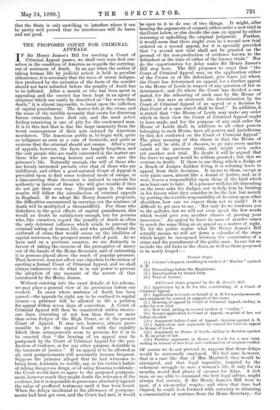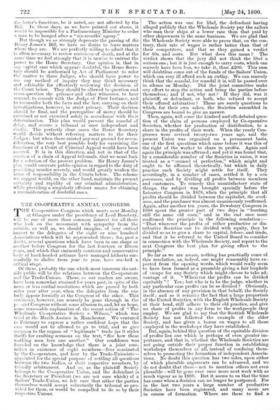THE PROPOSED COURT FOR CRIMINAL APPEALS.
IF Sir Henry James's Bill for erecting a Court of Criminal Appeal passes, we shall very soon find our- selves in the condition of America as regards the carrying- out of sentences of death. In an age when the notion of taking human life by judicial action is held in peculiar abhorrence, it is necessary that the wave of moral indigna- tion produced by the narration of the facts of the murder should not have subsided before the penalty of death has to be inflicted. After a month or two has been spent in appealing, and the convict has been kept in an agony of suspense which can easily be described as "far worse than death," it is almost impossible to insist upon the infliction of capital punishment. The horror felt at the crime, and the sense of the terrible necessity that exists for deterring future criminals, have died out, and the most active feeling remaining is one of pity for the condemned man. It is to this fact that is due the large immunity from the worst consequences of their acts enjoyed by American murderers. The American public is, to begin with, quite as indignant as ours at a case of homicide, and quite as anxious that the criminal should not escape. After a year of appeals, however, the facts are largely forgotten, and the only people who are really interested in the matter are those who are moving heaven and earth to save the prisoner's life. Naturally enough, the will of those who are keenly interested prevails over that of those who are indifferent, and either a good-natured Court of Appeal is prevailed upon to find some technical mode of escape, or a time-serving State Governor is induced to exercise his authority in favour of those who will give trouble if they do not get their own way. Depend upon it, the same results will follow the introduction of criminal appeals in England. If we adopt Sir Henry James's proposals, the difficulties encountered in carrying out the sentence of death will be multiplied a thousandfold. For those who disbelieve in the good effects of capital punishment, this would no doubt be satisfactory enough, but for persons who, like ourselves, regard the penalty of death as often the only deterrent influence which avails to prevent the criminal taking of human life, and who greatly dread the outbreak of crime that would ensue on the abolition of capital sentences, the prospect seems full of peril. As we have said on a previous occasion, we are distinctly in favour of taking the exercise of the prerogative of mercy out of the hands of the Home Secretary, and of entrusting it to persons placed above the reach of popular pressure. That, however, does not affect our objection to the notion of erecting a formal Court of Criminal Appeal, and we shall always endeavour to do what is in our power to prevent the adoption of any measure of the nature of that introduced by Sir Henry James.
Without entering into the exact details of his scheme, we may place a general view of its provisions before our readers. In cases where sentence of death has been passed—the appeals by right are to be confined to capital crimes—a prisoner will be allowed to file a petition for appeal within seven days of conviction. A Court of Criminal Appeal will then be constituted within twenty- one days, consisting of not less than three or more than seven Judges of the High Court, or of the present Court of Appeal. It may not, however, always prove possible to get the appeal heard with the rapidity which these arrangements seem to promise, for it is to be enacted that "the hearing of an appeal may be postponed by the Court of Criminal Appeal for the pro- duction of evidence, or for any other purpose desirable in the interests of justice." If an appeal is to be allowed at all, such postponements will necessarily become frequent. Suppose the prisoner alleged that he had witnesses to bring from Australia to testify, say, to his victim's habits of taking dangerous drugs, or of using firearms recklessly : the Court would have to agree to the proposed postpone- ment, however much they might doubt the relevancy of the evidence, for it is impossible to pronounce absolutely against the value of proffered testimony until it has been heard. When the delays incidental to the allowance of postpone- ments had been got over, and the Court had met, it would a commutation of sentence from the Home Secretary,—for be open to it to do one of two things. It might, after heaniig the arguments of counsel, either order a new trial in the Court below, or else decide the case on appeal by either reversing or upholding the original judgment. Further, it would seem that there might even be a second new trial ordered on a second appeal, for it is specially provided that "a second new trial shall not be granted on the ground of the non-production of evidence known to the defendant at the time of either of the former trials." Nor do the opportunities for delay under Sir Henry James's Bill stop here. The Bill proposes to enact that "the Court of Criminal Appeal may, on the application either of the Crown or of the defendant, give leave (a) where the Court has determined an appeal, for a further appeal to the House of Lords in respect of any question of law so determined ; and (b) where the Court has decided a case stated, for the rehearing of such case by the House of Lords ; but save as aforesaid, the determination by the Court of Criminal Appeal of an appeal or a decision by that Court of a case stated shall be final." In addition, it is stated that "the House of Lords may make any order which in their view the Court of Criminal Appeal ought to have made, and for the purpose of any such order the House of Lords shall, in addition to all other powers belonging to such House, have all powers and jurisdiction by this Act conferred on the Court of Criminal Appeal." The plain meaning of this clause is that the House of Lords will be able, if it chooses, to go into every matter raised at the previous trials, and might even order yet another new trial. No doubt it will be argued that the leave to appeal would be seldom granted ; but this we venture to doubt. If there is one thing which a Judge or a Bench of Judges dislikes doing, it is refusing leave to appeal from their decisions. It seems to them, except in very plain cases, almost like a denial of justice, and, as it were, forces a responsibility upon them of the kind which men least care to take. If a prisoner with his life depending on the issue asks his Judges, not to help him by twisting in his favour what they consider to be the law, but merely by putting the terrible responsibility of decision upon other shoulders, how can we expect them not to yield ? It is difficult to get men to say : 'Not only do we condemn you to the gallows, but we will not even speak the few words which would give you another chance of proving your innocence.' An appeal by leave in cases of murder comes to much the same thing as an appeal as a matter of right. To let the public realise what Sir Henry James's Bill actually means, we will set down a calendar of the steps which might be interposed between the commission of a crime and the punishment of the guilty man. In our list we include the old links in the chain, as well as those proposed to be newly forged :—
Present stages.
(1.) Coroner's Inquest, resulting in verdict of" Murder" against A. B.
(2.) Proceedings before the Magistrate.
(3.) Investigation by Grand Jury.
(4.) Trial at Assizes.
Additional stages proposed by Sir II. James's Bill.
(5.) Application by A. B. for the constituting of a Court of Criminal Appeal.
(6.) Application to Court on behalf of A. B. for a postponement, and argument by counsel in support of the same.
(7.) Hearing of appeal by Court of Criminal Appeal, ending in order for new trial.
(8.) New trial, ending in second verdict of "Guilty."
(9.) Second application to Court of Appeal, on point of law not before decided.
(10.) Argument before Court of Appeal : decision against A. B.
(11.) Application and argument by counsel for leave to appeal to House of Lords.
(12.) Argument in House of Lords, ending in decision against A. B. on point of law.
(13.) Further argument in House of Lords for a new trial, ending in refusal of new trial and confirmation of original verdict.
Of course we do not pretend to suppose that these delays would be universally employed. We feel sure, however, that in a case like that of Mrs. Maybrick they would be attempted, and that legal ingenuity, inspired by the vehement struggle to save a woman's life, if only for six months, would find plenty of excuses for delay. A rich man, or one able to command the best legal advice, might always feel certain, if Sir Henry James's Bill were to pass, of a six-months' respite ; and when that time had elapsed, he could look forward with certainty to obtaining the latter's functions, be it noted, are not affected by the Bill. In these days, as we have pointed out above, it would be impossible for a Parliamentary Minister to order a man to be hanged after a "six-months' agony." But though we so strongly deprecate the passing of Sir Henry James's Bill, we have no desire to leave matters where they are. We are perfectly willing to admit that it is often necessary to review sentences of death, and at the , same time we feel strongly that it is unwise to entrust the power to the Home Secretary. Our opinion is, that in any capital case which appears doubtful, the Home Secre- tary should be authorised by Act of Parliament to refer the matter to three Judges, who should have power to use any method of inquiry they may think necessary and advisable for effectively reviewing the decision of the Court below. They should be allowed to question and cross-question the prisoner and other witnesses, to hear counsel, to consult with the Judge of First Instance, and to reconsider both the facts and the law, carrying on their investigations, however, in strict privacy. Their decision should be final, and the prerogative of mercy should be exercised or not exercised solely in accordance with their determination. This plan would prevent the scandal of delay, and secure a tribunal at once independent and elastic. The perfectly clear cases the Home Secretary would decide without referring matters to the three Judges; but when there existed any real ground for recon- Sideration, the very best possible body for exercising the functions of a Court of Criminal Appeal would have been secured. It is in this direction, and not in that of the erection of a chain of Appeal tribunals, that we must look for a solution of the present problem. Sir Henry James's plan would enervate public opinion in regard to the duty of punishing murder severely, and would greatly weaken the sense of responsibility in the Courts below. The scheme we suggest would, on the other hand, maintain the present certainty and rapidity of our criminal administration, while providing a singularly efficient means for obtaining a reconsideration of doubtful cases.



































 Previous page
Previous page